 |
 |
 |
||||||||||||||
News from the Center for Creative Problem Solving:
Legal Pluralism in Latin America: Challenges and Comparative Perspectives
San Diego, California May 5 and 6, 2011
 |
An interdisciplinary conference co-sponsored by the Center for Iberian and Latin American Studies at University of California, San Diego and the Center for Creative Problem Solving at California Western School of Law.
Many Latin American countries are accepting the premise that traditional legal systems have a rightful place within the modern state. The two systems, however, are highly divergent, and significant work is still to be done to create a functional pluralistic system that respects indigenous peoples’ right of self-determination, international human rights obligations, and institutionalizes a means of adjudicating outcomes when indigenous and national legal systems clash. This conference will discuss those challenges for Latin America, drawing on the experiences of Canada and the U.S.
Opening Session and First Panel
Thursday, May 5, 2011
3 p.m. to 5:30 p.m.
Lecture Hall 2, California Western School of Law
350 Cedar Street, San Diego, California, 92101
Reception to follow (5:30 p.m. to 7:30 p.m.), sponsored by ACCESO Indigena.
Panels
Friday, May 6, 2011
9 a.m. – 4:45 p.m.
Weaver Center, Plaza of the Americas
University of California, San Diego
10111 North Torrey Pines Road, La Jolla, California, 92093
Luncheon provided to conference participants and attendees who RSVP.
Usos y Costumbres Video
Please RSVP to Isela Brijandez at ibrijandez@ucsd.edu to ensure you are registered for the luncheon on May 6, 2011 at UCSD’s Plaza of the Americas.
For more information, please call Professor David Mares, Director of the Center for Iberian and Latin American Studies at UCSD at (858) 534-6050 or Professor James Cooper, Co-Director of the Center for Creative Problem Solving at California Western School of Law at (619) 525-1430.
| ________________________________________________________________________________ |
CWSL Student Gayani R. Weerasinghe Wins Partial Scholarship to Attend Justus Liebig University Giessen, Germany Summer Program in Intellectual Property Law
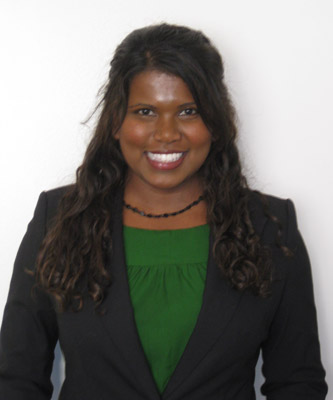 |
For Ms. Weerasinghe, who just finished her first year of law school at California Western School of Law, the program fits well into her career plans. She explains: “This is my second career path. I worked at the National Institute of Health (NIH) in Bethesda, Maryland before starting law school. I have a Masters in Molecular Biology from Johns Hopkins University in Baltimore, Maryland and I have co-authored twelve scientific publications on peer-reviewed journals, worked on research involving Cancer cells, Neurophysiology, Pharmacology, and Diabetes. Yet, as my interests began to gravitate toward the law, I wanted to combine my passion for law with my experience in science. As a lifelong scientist, my exposure to intellectual property law has been limited and I was thrilled to learn about Intellectual Property and Biotechnology program from the Universitat Justus Liebig of Giessen, Germany.”
Ms. Weerasinghe heard about the summer program from Adam Andrzejewski when he presented a seminar on “Patent Auctions” at CWSL in March 2011. Mr. Andrzejewski takes part as an instructor in the multidisciplinary program that links Intellectual Property law with biotechnology, business, and science. A number of differing professionals will provide the curriculum including leading patent and intellectual property attorneys from Europe and professors from the School of Economics and Business, School of Medicine, School of Law and School of Agricultural Sciences. The program will include lectures and seminars covering topics in patent and innovation, European patent law, international patent protection, intellectual property and competition law. Additionally, the program will provide students with an opportunity to visit leading biotechnology companies such as Merck and Bayer as well as apply for internship programs. Also, there is a three-day tour to Munich, which includes seminars from expert attorneys from the European Patent Office headquarters.
Says Ms. Weerasinghe, “I was honored to receive one of the five partial scholarships the program awarded. This program would be the perfect extension to my studies, because I am planning on taking the U.S. Patent Bar this summer.” Professors Barton and Cooper, Co-Directors of the the Center for Creative Problem Solving, could not be more excited about this development for Ms. Weerasinghe. “This is what our academic exchanges and speakers series are about,” says James Cooper, “We learn, we exchange ideas, and we grow our professional opportunities by creating such avenues for further learning and scholarship. We are most grateful to the teaching and administrative team at Universitat Justus Liebig of Giessen, Germany for extending this opportunity to Ms. Weerasinghe.”
| ________________________________________________________________________________ |
Adam Andrzejewski’s Gave a Presentation on Patent Auctions on Friday, March 25, 2011
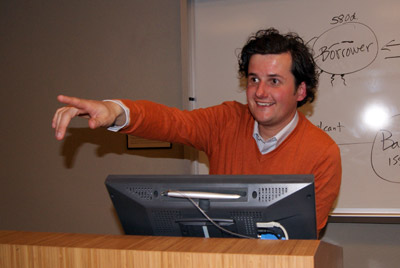 |
On March 25, 2011, Mr. Andrzejewski gave a talk called “Patent Auctions: The New Business Structure for Patent Assets, Acquisition and Sales”.
This presentation is based on Mr. Andrzejewski’s investigaton into development of mechanisms that sell Intellectual Property rights and monetize assets.
The Center for Creative Problem Solving is working to understand and develop new ways of enforceability of legal rights.
| ________________________________________________________________________________ |
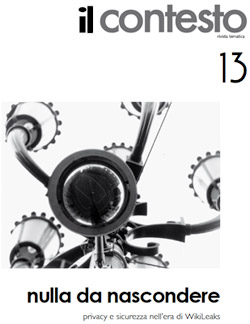 |
Professor James Cooper, Director of Proyecto ACCESO, and California Western School of Law colleague Professor Timothy Casey, were quoted extensively in the leading Italian intellectual periodical "Il Contesto".
Cooper's photographs also ran in the piece that was dedicated to border security and surveillance.
Cooper spent his last year during his legal studies at the Universitá degli studi di Siena in Italy in 1990 where he learned about the civil law tradition, Italian efforts in fighting terrorism and the role of judges in preserving democratic governance. He has lectured in a number of Italian universities.
For a copy of the article, please click here.
| ________________________________________________________________________________ |
Professor Thomas D. Barton Shares Problem Solving in Latin America
Professor Thomas D. Barton has been going to Latin America for years to share problem-solving ideas with the law enforcement community, legal scholars, and policy makers.
PLease find hereunder his latest contribution on the challenges to the rule of law and the tensions that exist in legal practice today.
The Tension of Preservation and Unfairness - English Version
La Tensión entre la preservación y la injusticia - Spanish Version
| ________________________________________________________________________________ |
Center for Creative Problem Solving Hosts U.S. State Department Visitors at California Western School of Law
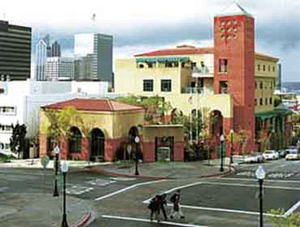 The Center for Creative Problem Solving played host to a group of lawyers from around the world on July 31, 2009. The San Diego-based International Visitors Council asked the Co-Directors of the Center for Creative Problem Solving, Professors Thomas D. Barton and James Cooper, to introduce the lawyers from Algeria, Cambodia, Liberia, Hong Kong, Portugal, Rwanda, and elsewhere to the principles of problem solving and prevention.
The Center for Creative Problem Solving played host to a group of lawyers from around the world on July 31, 2009. The San Diego-based International Visitors Council asked the Co-Directors of the Center for Creative Problem Solving, Professors Thomas D. Barton and James Cooper, to introduce the lawyers from Algeria, Cambodia, Liberia, Hong Kong, Portugal, Rwanda, and elsewhere to the principles of problem solving and prevention.
Associate Dean William Aceves of California Western School of Law joined the speakers in a discussion of new technologies for legal education and the use of popular culture in providing greater knowledge about human rights and more access to justice.
Professor Miguel Lopes Romao of the Faculty of Law at the University of Lisbon in Portugal, one of the guests on campus, commented: “This has been a great experience for us. We are most excited by what you are doing here in developing new ways to educate law students and the general public.”
| ________________________________________________________________________________ |
PREVENTIVE LAW AND CREATIVE PROBLEM SOLVING:
MULTI-DIMENSIONAL LAWYERING
By Thomas D. Barton and James M. Cooper
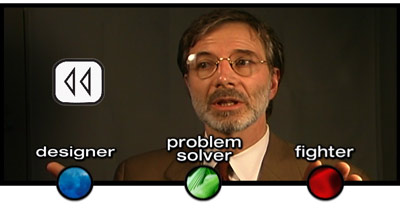 |
Lawyers are typically regarded, and regard themselves, along only one dimension: the Fighter who advocates zealously toward vindicating the violated rights of a client. The aim of California Western School of Law, its Louis M. Brown Program in Preventive Law, and its McGill Center for Creative Problem Solving, is to explore and promote two other dimensions of lawyering: the Problem Solver and the Designer.
The Fighter uses and responds to power: the power of the State, the power of legal rules, and the power of a just cause strongly advocated. The Fighter’s power flows from on high, down through a structured vertical system that, in its upper reaches, transcends every individual. The legal system is majestic: it permits itself to be summoned and used by those who understand its operation, speaking properly the language of authority, rights, and rules. Access to the power of the legal system, however, is carefully guarded within its hierarchical structure. As each higher rung of the judicial ladder is reached the power is greater but so is its formality and its remoteness from those whose problems it is meant to resolve.
Click here to read the entire article.
| ________________________________________________________________________________ |
Dean William J. Aceves presents the Graphic Law Project during a poster session at COMICON 2009
Please click here for more news about the Graphic Law Project
http://www.cwsl.edu/aceves/sketches/index.htm
http://chronicle.com/article/Bam-Pow-Footnote-/20918/
http://www.sddt.com/files/media/view7.cfm?media=D1DGQSBB
http://californiawestern.podbean.com/2009/07/22/using-graphic-arts-in-legal-education/
| ________________________________________________________________________________ |
Hacia Una Nueva Arquitectura:
La Creatividad En La Solución De Problemas Y
La Evolución De La Ley
JAMES M.COOPER
Una gran época ha comenzado.
Existe un nuevo espíritu…
Nuestra época ésta determinada, día a día, en su propio estilo.
Tristemente, nuestros ojos, no pueden todavía discernirlo.
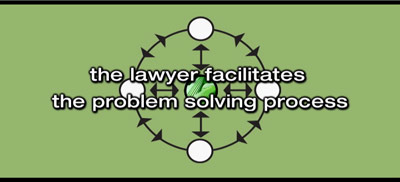 |
Con estas palabras, Le Corbusier introdujó una nueva arquitectura en el siglo veinte. Una nueva forma de construir las estructuras ha comenzado. El mundo estaba entrando completamente a una nueva era Moderna con respeto al progreso en las artes, literatura, salud, planificación urbana, y las ciencias sociales. Estos cambios trajó una serie de conflictos y discordia en la sociedad. Como explicó Le Corbusier: «Estamos viviendo en un período de reconstrución y adaptación a nuevas condiciones sociales y económicas.» Para el visionario Suizo, una buena arquitectura fue hecha con el propósito de obtener unas buenas relaciones sociales. Confrontando lo que era un tiempo incierto, Le Corbusier estababa tratando de evitar discordias. En esencia, una buena arquitectura y planificación podria evitar la necesidad de una revolución.
La ley también ha remplazado la necesidad de una revolución; por el contrario,la ley ha evolucionado. Basándose en las reglas del precedente, los preceptos legales han seguido un paso linear de desarrollo. Siguiendo la rutina de la tradición, la ley se ha convertido en la herramienta por la cual la sociedad se regula. Los asuntos de orden de ley y sus contituyentes, aseguran un patrón de estabilidad entre los interesados de esta plétora. Pero en los últimos cincuenta años, nuestras vidas han cambiado rápidamente, y las influencias y los estímulos que afectan nuestra existencia cotidiana se han diversado y divergido increiblemente. La ley, como una tradición aferrada a las reglas no se ha podido mantener al día con los cambios en nuestro tiempo. Como excribió Le Corbusier acerca de su generación a la entrada de la era Moderna:
«Existe un gran desacuerdo entre el estado moderno de la mente, el cual es una amonestación para nosotros, y la ríjida acumulación del deteriodo por causa del tiempo. El problema es uno de adaptación.»
Leer el artículo completo aquí.
| ________________________________________________________________________________ |
A Window Opens:
Importing Horizontal Systems of Justice during a Time of Judicial Reform
JAMES M.COOPER
Since the many authoritarian regimes in Latin America came to an end, the U.S. and European governments, international aid agencies, multilateral financial institutions and development banks have assisted many states in the region in the transition towards democratic governance. Generally, lending and granting programs have focused on improving access to justice and promoting the rule of law in two distinct forms: The first is judicial reform, focusing on mechanisms by which the judiciary can exact justice in an independent, fair, and efficient manner, separate from political pressures. Programs in this arena have focused on increasing judicial budgets, training judges and other court employees in new procedures, and streamlining case management and other administration of justice tasks. The second form of rule of law programs relate to legal reform – the drafting of new model criminal, civil and administrative codes for promulgation and implementation in a developing free market economy.
Click here to read the entire article.
| ________________________________________________________________________________ |
Problem-Solving Courts: A Growing U.S. Export
As the trade deficit continues to balloon, the United States is exporting one product with great success: judicial problem-solving mechanisms. Judges from around the United States are traveling the world to educate fellow jurists on innovations that bring speedier resolutions and to share methods for administering more transparent justice.
This is an ideal time for members of our judiciary to share their successes with their colleagues globally. Much of the developing world is moving away from inquisitorial criminal procedures and toward more adversarial or accusatory models. Not only are oral advocacy skills at a premium, but judges are being asked to redefine their roles and assume new responsibilities to assist in the transition to greater transparent and participatory judicial proceedings. Help is on its way.
CLick here to read the entire article.
Copyright 2012 CWSL. All rights reserved